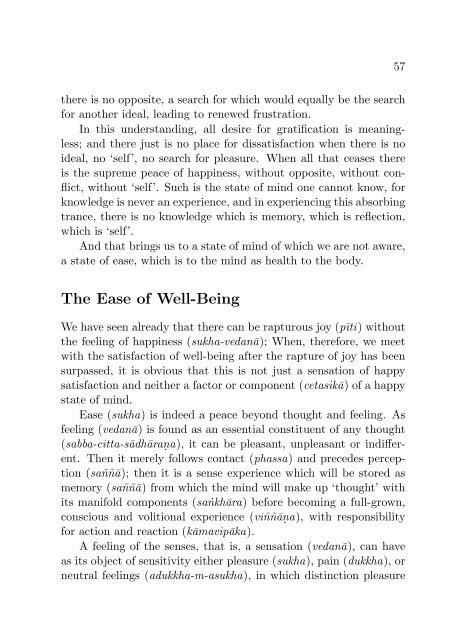Agony and Ecstasy
A comparative study of the five hindrances, together with the five states of concentration or mental absorption.
A comparative study of the five hindrances, together with the five states of concentration or mental absorption.
You also want an ePaper? Increase the reach of your titles
YUMPU automatically turns print PDFs into web optimized ePapers that Google loves.
57<br />
there is no opposite, a search for which would equally be the search<br />
for another ideal, leading to renewed frustration.<br />
In this underst<strong>and</strong>ing, all desire for gratification is meaningless;<br />
<strong>and</strong> there just is no place for dissatisfaction when there is no<br />
ideal, no ‘self’, no search for pleasure. When all that ceases there<br />
is the supreme peace of happiness, without opposite, without conflict,<br />
without ‘self’. Such is the state of mind one cannot know, for<br />
knowledge is never an experience, <strong>and</strong> in experiencing this absorbing<br />
trance, there is no knowledge which is memory, which is reflection,<br />
which is ‘self’.<br />
And that brings us to a state of mind of which we are not aware,<br />
a state of ease, which is to the mind as health to the body.<br />
The Ease of Well-Being<br />
We have seen already that there can be rapturous joy (pīti) without<br />
the feeling of happiness (sukha-vedanā); When, therefore, we meet<br />
with the satisfaction of well-being after the rapture of joy has been<br />
surpassed, it is obvious that this is not just a sensation of happy<br />
satisfaction <strong>and</strong> neither a factor or component (cetasikā) of a happy<br />
state of mind.<br />
Ease (sukha) is indeed a peace beyond thought <strong>and</strong> feeling. As<br />
feeling (vedanā) is found as an essential constituent of any thought<br />
(sabba-citta-sādhāraṇa), it can be pleasant, unpleasant or indifferent.<br />
Then it merely follows contact (phassa) <strong>and</strong> precedes perception<br />
(saññā); then it is a sense experience which will be stored as<br />
memory (saññā) from which the mind will make up ‘thought’ with<br />
its manifold components (saṅkhāra) before becoming a full-grown,<br />
conscious <strong>and</strong> volitional experience (viññāṇa), with responsibility<br />
for action <strong>and</strong> reaction (kāmavipāka).<br />
A feeling of the senses, that is, a sensation (vedanā), can have<br />
as its object of sensitivity either pleasure (sukha), pain (dukkha), or<br />
neutral feelings (adukkha-m-asukha), in which distinction pleasure

















